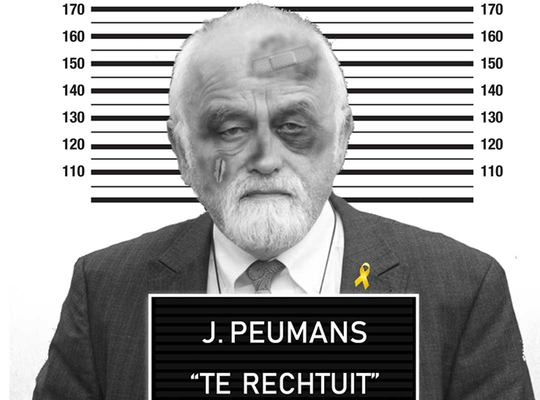You are here
EU heads have been in the sand on the Catalan question for a year now

“It is a disgrace that in the year 2018, a European member state has political prisoners. It is our task to keep the Catalan flame burning and keep on fighting against this injustice.” Jong N-VA (N-VA Youth) held a symbolic action for the Catalan prisoners in front of the buildings of the European Commission, at the initiative of Michiel Descheemaeker. “One year after the Catalan referendum, we are highlighting the ongoing deafening silence of the European Commission on the whole Catalan question,” says Michiel Descheemaeker. Apart from the action in front of the European Commission, there will also be an online action, in which the situation is extrapolated to Flanders. Chair of Jong N-VA Tomas Roggeman says: “What if Flanders was Catalonia? Would those people end up in prison too?”
1 year since the referendum
Today, 1 October, marks one year since the Catalans went to the polls in a referendum on the independence of their region. The images that went around the world at the time were unfortunately not those of what could have been a proud day for democracy, but of a Spanish fury in which truncheon-wielding Spanish commandos let the Catalans know that they would be Spanish or not.
Heads in the sand
The Flemish Parliament condemned the excessive violence in a resolution. But Europe remained as quiet as a mouse, even after leaders of the Catalan movement ended up behind bars. “Today, the silence is still there. The European Commission is sticking its head in the sand and doing nothing. With this symbolic action, we want to literally put the commissioners’ heads in the sand. It is a disgrace that in the year 2018, a European member state is holding a witch-hunt against democratically elected representatives,” says Michiel Descheemaeker, explaining the purpose of Jong N-VA’s action.
Black and blue
Chair of Jong N-VA Tomas Roggeman is extrapolating the Spanish repression in Catalonia online to Flanders: “We want to keep on raising awareness among Flemings. We are launching a set of photos entitled ‘What if Flanders was Catalonia’: we have had politicians, representatives of civil society and comedians among others virtually beaten up until they were black and blue and then put behind bars. Each one is simply trying to express his or her opinion, just like the Catalans are doing. Fortunately, here in Flanders they are not thrown into prison for expressing their opinion. A shocking image with which we want to make it clear that what happened in Spain goes far beyond the limits of normality.”

